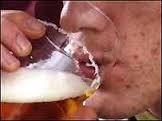Helping an alcoholic recover from alcoholism
Helping an alcoholic recover from alcoholism: What can I do to help my friend?
Over the years we make new friends and keep old ones because we all value what friendship. And because of our attachment to our friends, it would be improper seeing our friends go through certain difficulties which need our help and do nothing. One very common problem that is affecting the current generation is issues to do with drug abuse and addiction. Young people are the major victims and most of our friends fall within this bracket. Take for instance the misuse of alcohol, this is problem is causing havoc in many families and neighborhoods. Therefore helping an alcoholic recover from alcoholism is one very important thing you can do for a friend say doctor Dalal Akoury MD and founder of AWAREmed Health and Wellness Resource Center. Doctor Akoury was motivated into forming this establishment due to the suffering of many young people who have resorted into drug addiction. In her experience of over two decades, doctor Akoury has been very instrumental in offering professional treatment to many patients across the globe with so many success stories being credited to her. As we progress into this discussion, if by any chance you are struggling with alcoholism or any kind of substance abuse, then you may want to consider scheduling for an appointment with doctor Akoury today for the commencement of your recovery journey.
Meanwhile about helping an alcoholic recover from alcoholism, experts at AWAREmed Health and Wellness Resource Center under the able leadership of doctor Dalal Akoury says that it is possible for you to help a friend who is in serious trouble with alcohol or other drugs. However it is important to note that whether or not your friend accepts your help or takes your advice and gets benefits from it is really your friend’s decision and responsibility. Helping is very good and very noble for that matter, but it come with a great challenge and a lot of effort on your side will be very important. You will need to know more about the condition of your friend for you to be on top everything. This way, you will be in a better position of helping. Sometimes it may be necessary that you approach the patient in company of another trusted mutual friend whose role would be to make conversation between the two of you flow effectively.
Helping an alcoholic recover from alcoholism: Laying the ground work in helping an alcoholic friend
According to the experts at AWAREmed Health and Wellness Resource Center the first step in getting help is for your friend to talk to someone about his or her alcohol and drug use. Treatment will not be easy if your friend is not willing to open up into acknowledging the problem. You will need to make all the efforts to talk to your friend into admitting that there is a problem, and to agree to stop drinking or using other drugs completely. Remember that this must be as voluntary as possible, at no given time must you force, your part will only to encourage them and not making the decision for them. Your friend needs support and understanding, and someone they can trust to talk to about the problem. You can’t force a friend to get help, but you can encourage and support your friend to seek and find professional help.
Along the way things may not go as you had expected and this is normally the way. If this becomes the situation and you are worried about a friend, it is important for you to speak to someone in private who is knowledgeable and reassuring. And for the avoidance of doubt telling someone isn’t being disloyal to your friend. It’s important to know the facts about what’s happening to your friend if you plan to help in a more meaningful way. Remember not to try helping your friend on your own until you have talked to someone you can trust the people you may want to talk to may include a counselor, teacher, doctor, nurse, parent, or someone at your church or synagogue. Be very particular and ask this person to keep the conversation confidential. You don’t have to mention your friend by name; you can just talk generally about the problem. Talking to a professional will help you figure out what the best steps are for you to take.
If you decide to speak to your friend, here are some guidelines that you and your advisor should consider in planning how and what you could do to help:
- The timing for the talk must be right. Only talk to your friend when he or she is sober or straight before school is a good time.
- Never accuse your friend of being an alcoholic or a drug addict, but do express your concern. Try not to blame your friend for the problem; if you do, he or she might be turned off right away.
- Talk about your feelings. Tell your friend you’re worried, and how it feels for you to see him or her drunk or high on other drugs.
- Tell your friend what you’ve seen him or her do when drinking or using other drugs. Give specific examples. Tell your friend you want to help.
- Speak in a caring and understanding tone of voice, not with pity but with friendship.
- Be prepared for denial and anger. Your friend may say there is nothing wrong and may get mad at you. Many people with alcohol and other drug problems react this way. When confronted, many users will defend their use, blame others for the problem, or give excuses for why they drink or use other drugs.
- Find out where help is available. You could offer to go with your friend to get help, but be prepared to follow through. This gesture will show your friend that you really care.
You need to tell your friend that you are worried about him or her, and that someone who can help needs to be told. Your friend might get really mad at you, but if you say nothing, things may get worse and your friend may be in more danger. Any effort you make towards helping an alcoholic recover from alcoholism is a step in the right direction and will certainly add value to the lives of suffering addicts. Doing this is very important in rising up a strong and working society for generations to come.
Helping an alcoholic recover from alcoholism: What can I do to help my friend?





